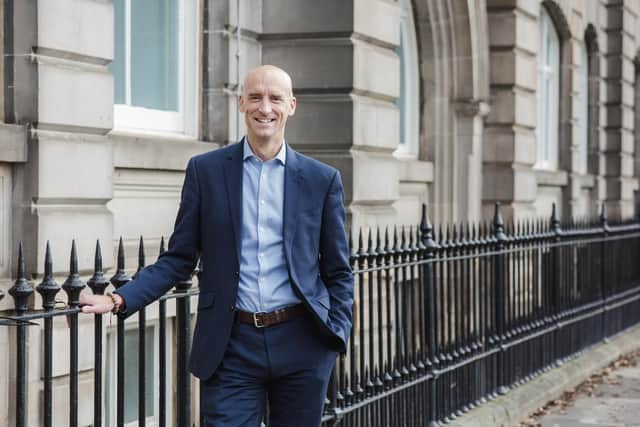Celebrities like Lewis Capaldi and Sam Thompson are helping more and more young Scots open-up about neurodiversity
A Scottish charity is finding a soaring number of young people and their families are seeking support after celebrities like Lewis Capaldi and Sam Thompson raised the profile of neurodiversity and helped to “normalise the conversation”.
The Salvesen Mindroom Centre in Edinburgh has been dealing with an 18 per cent rise in enquiries in the last year as more people ask for help with autism, dyslexia, ADHD and Tourette’s.
Advertisement
Hide AdAdvertisement
Hide AdAlan Thornburrow, the centre’s chief executive officer, said demand was “absolutely certain to rise” further, amid growing awareness of neurodiversity and the work of the Mindroom Centre.


One factor, he told The Scotsman, was the impact of celebrities like Scottish singer Lewis Capaldi, who has previously discussed his Tourette’s diagnosis and was supported by thousands of fans during an emotional set at Glastonbury Festival this year.
Sam Thompson, a star of Made in Chelsea and this year’s winner of I’m a Celebrity... Get Me Out of Here, has also spoken of his recent diagnosis with ADHD and autism.
Mr Thornburrow said the experience of high profile figures in the arts and business was helping younger generations feel more comfortable talking about their own neurodivergency.
“It seems sort of ancillary, but I think it is significant,” he said. "So whether you were watching I’m A Celebrity… or whether you were watching Lewis Capaldi or somebody like that, there is more and more people talking about their own journey, and that helps to normalise the conversation as much as anything does, because people see folks that are like them and identify with that,” he said.


"We are seeing that is one of the drivers from a workplace point of view, leaders in businesses say, ‘well I’m dyslexic and I’ve sort of largely covered that up’.
"That has a bearing on others stepping forward and feeling comfortable doing the same.”
Despite the progress in recent years, however, Mr Thornburrow said there was still work to be done to end the “stigma”.
Advertisement
Hide AdAdvertisement
Hide AdHe said: "There is a lot of stereotyping around, ‘because I’m autistic this means I will behave in that fashion’, or ‘I have Tourette’s syndrome this means I’m likely to behave in that fashion’.
"We’re trying to debunk a lot of that. But I guess it comes back to, if you create conditions for people to be more themselves, they will get a lot more out of each other."
Mr Thornburrow compared it to recent progress in the dialogue around mental health and wellbeing, and guessed that neurodiversity was “probably about five years behind that”.
He said: “We’re beginning to step up and learn more, we’re beginning to get more comfortable with what it is and what it isn’t, but there is still quite a long way to go to normalise the conversation.”
It is estimated that around 15 per cent of the population are neurodivergent. Salvesen Mindroom supports children and young people under the age of 25, from across Scotland, with all forms of neurodiversity.
Set up in 2000, the charity expanded in 2015 with £5 million of support from Alastair and Elizabeth Salvesen, one of Scotland’s richest families, linked to the former Christian Salvesen shipping group.
The donation helped establish a research hub, based at Edinburgh University, which is a sister organisation to the Mindroom Centre.
The centre, which has supported about 1,300 people this year to date, has a team of 27 staff, including an educational psychologist, as well as former lawyers, social workers and teachers.
Advertisement
Hide AdAdvertisement
Hide AdAs well as working with young people and their families, the charity helps employers to understand more about neurodiversity, and lobbies for action from decision-makers.
Mr Thornburrow said it was hard to get the message across in the current financial climate that there can be a cost-saving to the public purse in the long run if young people are able access support earlier.
The Mindroom Centre provides help where it can, with more social workers and other professionals directing families towards such charities, in an era of long waiting lists for children and adolescent mental health services (CAMHS).
"The public provision is not there, and we’re stepping into the gap, as many charities are doing, but doing so in a way that is actually difficult to fund and secure support to deliver sustainably,” said Mr Thornburrow.
Families also self-refer to the centre, often because of issues experienced by young people in education.
"The biggies are understanding your rights and the responsibilities of the school. Secondly about accessing the curriculum,” said Mr Thornburrow.
"So if I’m autistic or dyslexic or otherwise, it doesn’t have any bearing on my aptitude or capability, but maybe it is difficult to access the curriculum in the way it is delivered.”
He added: "Our job I suppose is to try to help people get to a better place. So we principally try to focus on improving communication between schools and young people and other services, and the families."
Advertisement
Hide AdAdvertisement
Hide AdThe charity’s latest initiative is a three-year specialist outreach service, financed by a grant of more than £100,000 from the National Lottery Community Fund, to deliver a dedicated one-to-one support service for young people in North and South Lanarkshire.
It was also awarded a £116,000 grant from the Scottish Government to provide individualised in-school support.
Mr Thornburrow said: "We’re not the sort of organisation that just wants to throw stones and say, ‘you’re getting it all wrong’.
"We have got some models of intervention that deliver outcomes that you would hope to see.
"So we want to be able to, not just hold them up and put a begging bowl out, but to suggest these are things that could be implemented into curriculum.”
He added: “If we can try to offer solutions then that is the space we want to be in.”
Comments
Want to join the conversation? Please or to comment on this article.
